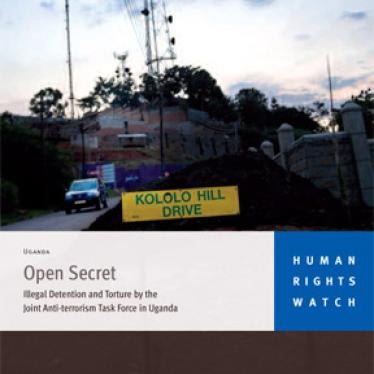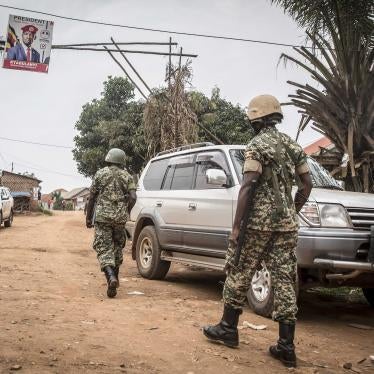(Kampala) - The Ugandan government should take prompt action to end unlawful arrest and torture by its anti-terrorism unit, Human Rights Watch said in a report released today.
The 89-page report, "Open Secret: Illegal Detention and Torture by the Joint Anti-terrorism Task Force in Uganda," documents the task force's abusive response to alleged rebel and terrorist activity by unlawfully detaining and brutally torturing suspects. Human Rights Watch found that agents of JATT, as it is known, carry out arrests wearing civilian clothes with no identifying insignia and do not inform suspects of the reasons for their arrest. The agents force suspects into unmarked cars, blindfolded and handcuffed, and take them to JATT's headquarters in Kololo, a rich suburb of Kampala. Many are then taken to military intelligence headquarters in Kitante for further brutal interrogations.
"Surrounded by ambassadors' residences and lush mansions in Kololo, JATT detains and beats suspects and holds them for months without any contact with family or lawyers," said Georgette Gagnon, Africa director at Human Rights Watch. "Uganda conveniently uses the broad mantle of anti-terrorism to abuse and torture suspects."
Human Rights Watch found that over the past two years, the unit illegally detained more than 100 people and tortured at least 25 during interrogations. Four died of their injuries, and the whereabouts of five others last seen in the unit's custody remain unknown. Human Rights Watch said the government has failed to hold responsible JATT members accountable for the abuses. The government has a duty both to end these practices and to prosecute those responsible, Human Rights Watch said.
Donors to the Ugandan security efforts, such as the United States and United Kingdom, who are training and supporting Uganda's counterterrorism operations, should work to ensure that basic rights are afforded to all suspects. These donors should withhold counterterrorism-related funding to the Ugandan security forces until the Ugandan government investigates abuses by JATT and the Chieftancy of Military Intelligence, or CMI, and prosecutes as appropriate those found to be involved.
JATT is a joint operation, formed in 1999, which draws its personnel from the police, the internal and external intelligence organizations, and military intelligence. The unit has no codified mandate, though the Ugandan Constitution requires any intelligence service to be established through an act of parliament.
The unit apparently defines its anti-terrorism mission in the broadest terms. Most suspects arrested by the unit are Muslims, a minority in the majority Christian nation, and are accused of some involvement with the Allied Democratic Forces (ADF), a Ugandan rebel group based in Congo. Other suspects include individuals with alleged links to al-Qaeda suspects. Although many detainees have been released without charges, some have been charged with terrorism or treason. Not one of those charged has had a trial, though some have been held for long periods on remand. Some former detainees also told Human Rights Watch that JATT personnel coerced them to seek amnesty from the government - allowed under Ugandan law for those accused of certain eligible crimes - but those amnestied end up stigmatized as rebels.
The report is based on extensive interviews that Human Rights Watch conducted with more than 80 witnesses, family members of detainees and victims, including 25 former detainees of the Kololo headquarters, who described their detention and torture in stark detail.
JATT personnel beat suspects with the butts of guns, fists, whips, canes, chairs, and boots during interrogations. They forced red chili pepper into suspects' eyes, nose, and ears, causing excruciating pain. Some detainees reported that JATT personnel used electricity to shock them during interrogations. Many said they had been forced to observe other detainees being tortured while in detention in Kololo and during interrogations at the headquarters of CMI in Kitante, Kampala.
Human Rights Watch uncovered several cases of death from torture. Saidi Lutaaya, a taxi driver, died at Mulago hospital on November 22, 2007, shortly after being arrested by the anti-terror unit. Hospital records indicate that he arrived in a comatose state, but information regarding the cause of his death was not completed on his death certificate. One detainee who saw Lutaaya in Kololo said that after being interrogated, he tried to stand up but fell over and appeared to be unconscious while guards told him he would be beaten for pretending to be injured. He had large head wounds. Military intelligence denied any knowledge of Lutaaya's arrest or death.
Another former detainee, Hamza Tayebwa, died shortly after being transferred from Kololo to Luzira prison. Former detainees witnessed anti-terror personnel beating Tayebwa in detention. Human Rights Watch is not aware of any investigations into these or other deaths of Kololo detainees.
While most individuals whose detention was documented by Human Rights Watch are male, there are instances of women being held in Kololo apparently because male family members were alleged to be affiliated with the rebel group. At one point in January 2008, detainees saw three children believed to be under 2 years old held with their mothers in Kololo. JATT has also illegally detained citizens of several foreign countries.
During a January 24, 2009 meeting with Human Rights Watch, the military intelligence chief, Brig. James Mugira, who has operational command over JATT forces, said that detainees are occasionally held beyond the 48-hour constitutional limit for detention prior to charge, but denied that its personnel mistreat the prisoners. Mugira said that "high profile" people are brought to the offices in Kololo to be held separately from common criminals. He maintained that Kololo was not "outside the law," despite the fact it has not been classified as a detention facility by the Minister of Internal Affairs, as required by law. Brig. Mugira hold Human Rights Watch that he intends to "polish up" JATT operations, but didn't specify what changes would take place. He has been in his current position since August 2008.
The Ugandan government has a responsibility under international law to investigate allegations of abuses by its forces and to hold those responsible to account. President Yoweri Museveni and the National Security Council should take an active role in curtailing those abuses and ensure that prosecutors have the independence to investigate torture and illegal detention by JATT. Parliament also has a mandated duty under Ugandan law to oversee the work of the military, the police, and the intelligence organizations, including JATT. But that oversight has not taken place, and allegations of abuse have been played down or ignored.
"The Ugandan government should act immediately to end torture by JATT and prosecute all those responsible, regardless of rank," said Gagnon. "The president and parliament should ensure that there is public scrutiny of JATT's activities and more oversight of the security and intelligence sector as a whole."
Selected accounts from former detainees of JATT's headquarters in Kololo
"I didn't sleep all night because I was afraid. In the morning, a group of men came in. One pointed a gun at me and said that I was a rebel. He asked me which part of the bush I had been in. The one pointing the gun at me made me lie down on the floor of the sitting room. One stepped on my head and another was beating me and stepping on my ankles and slapping me around the ears. They kept stepping on my head and beating me over and over again on the knees and ankles. They beat other people in front of me. One was laid down on the floor and then one of them stepped on his ribs. I saw many people being treated like that. It was hard to watch."
- Female detainee, arrested and detained for 10 days by JATT in their Kololo offices, before being charged in 2006. She was released on bail after two years in detention and was never tried.
"After four months in that garage in Kololo, I was taken to CMI, where I was interrogated and given a beating. When we went inside, the soldiers started beating me with a black whip. And then one hit me very hard on the back with the flat of his hand. It felt like my heart would burst out of my chest."
- Male detainee, arrested and detained for seven months by JATT in their Kololo offices and released without charge
"[The JATT agent] went out of the room and came back with a small plastic container, which had pepper in it. They started stuffing pepper in our eyes and Mucunguzi, who was holding the upper part of my eye while Semakula held down the lower lid, picked pepper from the container and pushed it into my eyes. I was the last to suffer this, so I saw very well what these guys were doing to my fellow detainees. Semakula had wrapped his hand with a polythene paper to avoid direct contact with the pepper in the plastic container as he stuffed it in our eyes. The pain was too much and at this point I could not see anything. Then they resumed the beating and I could tell not who was beating who."
- Male detainee, arrested and detained for 11 months by JATT in their Kololo offices and released without charge







